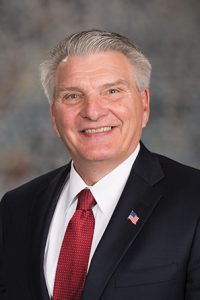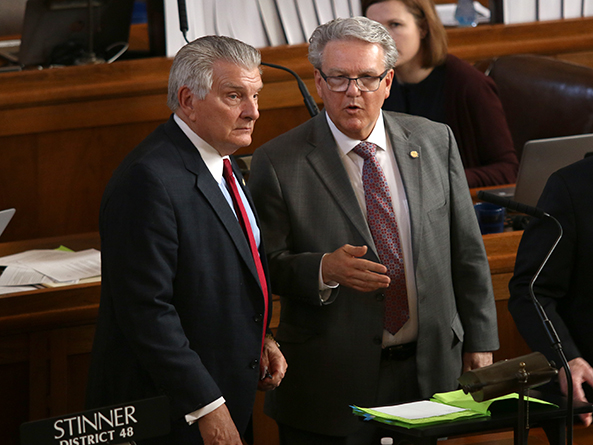Budget adjustments advanced after successful cloture votes
Lawmakers gave first-round approval March 12 to two bills comprising the Appropriations Committee’s adjustment proposal to the state’s $9.4 billion budget.

The state budget is structured on a two-year basis, with the budget enacted during legislative sessions held in odd-numbered years. Adjustments are made during sessions held in even-numbered years.
The committee’s proposal would result in a 3 percent overall growth in state spending and would increase the state’s Cash Reserve Fund—also known as the rainy-day fund—to $731.1 million. The package also would leave $133.8 million to fund bills passed this session.
Gering Sen. John Stinner, chairperson of the Appropriations Committee, said the adjustments reflect the committee’s main objectives of restoring the state’s cash reserve, controlling state spending growth, attaining a structural balance between revenue and spending and leaving enough money for property tax relief.
“Our fiscal posture for our state, I think, is strong,” Stinner said.
LB1008, introduced by Speaker Jim Scheer of Norfolk at the request of Gov. Pete Ricketts, is the mainline budget bill. It was replaced by an Appropriations Committee amendment, adopted 41-2. The amendment proposes adjustments to appropriations for state operations, aid and construction programs in the current and next fiscal year.
The amendment includes $55.2 million to address damage from the 2019 floods. It also incorporates the provisions of 19 additional bills, with a total cost of $15.2 million. The measures included:
LB773, sponsored by Gothenburg Sen. Matt Williams, which would transfer $10 million in general funds to the Rural Workforce Housing Investment Fund;
LB827, sponsored by Omaha Sen. Robert Hilkemann, which would provide a $3.7 million increase in developmental disability provider rates;
LB1018, sponsored by Omaha Sen. Tony Vargas, which would appropriate an additional $1.5 million to aid local public health departments;
LB1079, sponsored by Lincoln Sen. Anna Wishart, which would appropriate $250,000 in general funds to the Nebraska State Patrol crime lab to support the timely processing of sexual assault forensic evidence; and
LB1097, sponsored by Omaha Sen. Mike McDonnell, which would appropriate $458,000 over two years to the state Supreme Court to increase staffing for youth problem-solving courts.
Stinner said the bills would address a range of issues including workforce housing, prison overcrowding and aid to individuals. The committee attempted to include the highest priority items, he said, while noting that not all spending priorities could be addressed.
“This has been a tough three years,” he said. “There’s a lot of pent-up demand.”
Stinner said additional amendments may be offered during select file debate if a need arises for emergency or public health funding to address COVID-19, the new coronavirus disease—possibly as much as $20 million.
Lincoln Sen. Kate Bolz supported the bill and the amendment. She said the state’s cash reserve under the proposal would be approximately 14 percent in excess of the state’s appropriations and obligations.
“That’s pretty good,” Bolz said. “We aspire to about 16 percent, so we’re really in healthy shape for where we’re at in this fiscal year.”
Omaha Sen. Justin Wayne raised objections over some of the bills and provisions contained in the committee amendment, questioning the priorities outlined in the proposal. For example, Wayne said lawmakers should not provide $10 million for rural workforce housing when no direct appropriation for urban workforce housing has been approved during his time at the Legislature.
“There are some fundamental issues that will not allow me to go forward with this budget,” he said. “This budget places rural over urban [interests] and increases the rural and urban divide.”
Bolz disagreed, noting that the Appropriations Committee’s membership is required to include members from each of the state’s congressional districts, ensuring balanced representation. She said items such as flood relief, housing incentives and problem-solving courts are statewide initiatives that benefit all Nebraskans.
“I don’t think that we have a rural/urban divide or dichotomy in this budget,” she said. “I think the majority of what this budget does is lift up the state as a whole.”
In response to Wayne’s concerns, Scheer offered an amendment that would have stricken several sections of LB1008, including funding for Nebraska Career Scholarships to community and state colleges, $10 million for rural workforce housing and $500,000 for the Daugherty Water for Food Institute.
Omaha Sen. Ernie Chambers and Wayne then offered a series of motions and other amendments to extend debate on the mainline budget bill.
“I don’t have anything but the leverage of time,” Wayne said.
After six hours of debate, Scheer offered a motion to invoke cloture, which ceases debate and forces votes on the bill and all pending motions and amendments. The cloture motion was adopted on a vote of 40-3.
The Scheer amendment then was defeated on a vote of 2-38, and senators advanced LB1008 to select file 40-2.
Finally, LB1009, also introduced by Scheer at the request of the governor, would authorize and provide for certain fund transfers outlined in the mainline budget bill. Following a successful cloture motion, adopted 38-2 after an additional two hours of debate, the bill was advanced to select file on a vote of 40-1.


